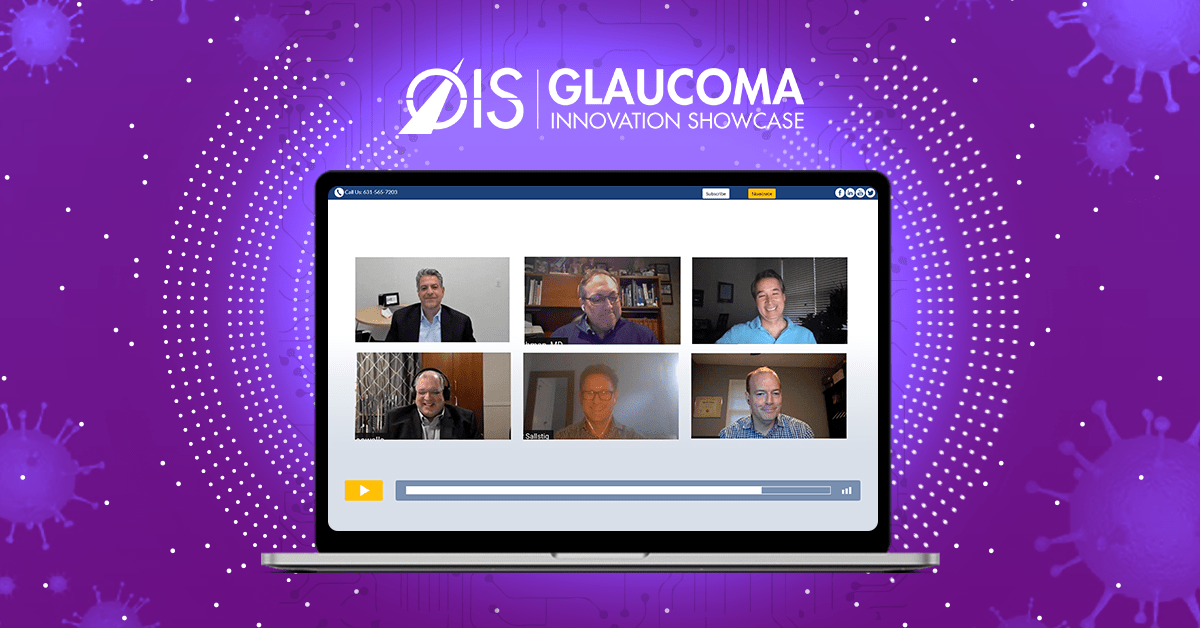COVID Can’t Lock Down Innovation in Glaucoma

Part 1 of 2
The global COVID-19 pandemic has caused some changes in how companies in the glaucoma space pursue new products and technology, but it hasn’t derailed those efforts. That was the consensus of the “Industry Insights on Glaucoma Market” panel at last week’s virtual OIS Glaucoma Innovation Showcase.
From the venture capital side, session moderator Robert Rothman, MD, partner at OCLI/Glaucoma Consultants of Long Island and founding partner and principal of InFocus Capital Partners, said the availability of capital for funding new companies and the focus on investment priorities have undergone significant change.
Trial Enrollment Slows Somewhat
For some trials, the pandemic has slowed enrollment, noted Mark Hagler, senior vice president, head of ophthalmics, oncology and long-term care, Sun Pharmaceuticals. This adds an element to consider for early stage programs, but doesn’t necessarily change the focus, Hagler said. For later-stage programs, no dramatic changes have occurred. “If we have a study in Phase III, we’re not going to go back and change the trial design,” he said. “We’re a little too far down the line.”
But today Sun evaluates new opportunities with the same calculations it used before the pandemic, Hagler added. “In addition to the standard things we look at — unmet needs, payer receptiveness, the total addressable market, competitor landscape, probability of clinical success — at the end of the day what we’re evaluating is which programs have the highest risk-adjusted net present value,” he stated. “That’s still how we’re making our decisions.”
Novartis Maintains Focus
Jehan Tamboowalla, head of new ophthalmic products, Novartis, said COVID hasn’t shifted the company’s focus much. In fact, Novartis has intensified efforts on the digital and telemedicine side. That, he said, is largely an effort to get patients and physicians together.
“One of the challenges we saw with COVID is patients simply were not going into the offices to seek medical care that was really critical to their well-being,” Tamboowalla explained. “So our goal on the medical therapeutic side has been to continue to move forward as planned and see what we can do to help when it comes to digital and telemedicine to make sure worldwide that our patients and physicians can come together, and outpatients can get the care that they need.”
Allergan Sees Opportunities In Sustained Release
Ramin Valian, VP, marketing interventional glaucoma, reimbursement pipeline, Allergan, said the pandemic has changed the dynamic of daily execution, including an increased focus on alternative ways of delivering messaging or technologies. He said the company saw an impact on clinical trials as enrollment centers shut down, but now patients are slowly coming back into offices.
“It certainly has created an opportunity in terms of understanding ways of extending therapy for patients, because, as we’ve seen, most patients are reluctant to come back into your practices,” Valian said. “So long term, drug delivery or sustained-release technology is a major area for us.”
He noted that two other areas emerging for Allergan are diagnostics and smarter screening technologies. “Those are the things that are changing the dynamic to market,” he added. “Our bigger challenge is trying to now marry our existing Phase III or early-stage platforms along with some of these virtually developing technologies like virtual screening or virtual diagnostics.”
Compressing Time, Speculating about the Future
Peter Sallstig, global head development division, senior vice president and corporate officer, Santen, said, if anything, the pandemic has helped accelerate the company’s work. “We have always been focused on ensuring that we had new and affordable medicine, and on how we conduct our trials,” he said. “We believe that with the COVID situation, more real-world evidence will be needed, more transparency requested. Some of the things we’re looking into and implementing involve e-consent, telehealth, and telemedicine.”
Robert Kissling, VP, medical affairs, Bausch + Lomb, said there’s much speculation about the future and the enduring effects of COVID; figuring out what’s temporary versus what’s going to stay is much of the challenge for companies. “As a company we’re aware the world may change, but we’re not certain how it will,” he said. “We’ll keep our eyes on that, but the fundamentals of R&D and drug development, and the needs of the patient, are going to be very similar.”
One optimistic piece of that puzzle, Kissling noted, is that ophthalmology has recovered much more quickly than some of the company’s larger businesses in systemic diseases.
Next week: Moving beyond micro-invasive glaucoma surgery devices.
